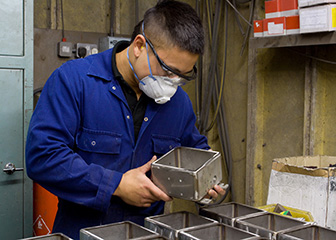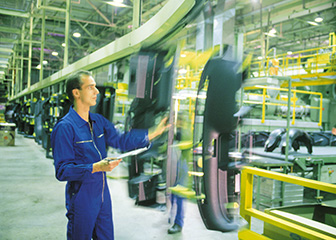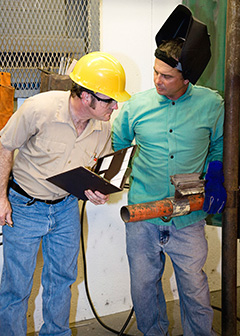
Quality control inspectors remove or discard all products and equipment that fails to meet specifications.
Quality control inspectors examine products and materials for defects or deviations from manufacturers’ or industry specifications.
Duties
Quality control inspectors typically do the following:
- Read and understand blueprints and specifications
- Monitor or observe operations to ensure that they meet production standards
- Recommend adjustments to the process or assembly
- Inspect, test, or measure materials or products being produced
- Measure products with rulers, calipers, gauges, or micrometers
- Accept or reject finished items
- Remove all products and materials that fail to meet specifications
- Discuss inspection results with those responsible for products
- Report inspection and test data
Quality control inspectors ensure that your food will not make you sick, that your car will run properly, and that your pants will not split the first time you wear them. These workers monitor quality standards for nearly all manufactured products, including foods, textiles, clothing, glassware, motor vehicles, electronic components, computers, and structural steel. Specific job duties vary across the wide range of industries in which these inspectors work.
Quality control workers rely on a number of tools to do their jobs. Although some still use hand-held measurement devices, such as calipers and alignment gauges, they more commonly operate electronic inspection equipment, such as coordinate-measuring machines (CMMs). Inspectors testing electrical devices may use voltmeters, ammeters, and ohmmeters to test potential difference, current flow, and resistance, respectively.
Quality control workers record the results of their inspections and prepare test reports. When they find defects, inspectors notify supervisors and help to analyze and correct the production problems.
In some firms, the inspection process is completely automated, with advanced vision inspection systems installed at one or several points in the production process. Inspectors in these firms monitor the equipment, review output, and do random product checks.
The following are types of quality control inspectors:
Inspectors mark, tag, or note problems. They may reject defective items outright, send them for repair, or fix minor problems themselves. If the product is acceptable, the inspector certifies it. Inspectors may further specialize:
- Materials inspectors check products by sight, sound, or feel to locate imperfections such as cuts, scratches, missing pieces, or crooked seams.
- Mechanical inspectors generally verify that parts fit, move correctly, and are properly lubricated. They may check the pressure of gases and the level of liquids, test the flow of electricity, and do test runs to ensure that machines run properly.
Testers repeatedly test existing products or prototypes under real-world conditions. Through these tests, manufacturers determine how long a product will last, what parts will break down first, and how to improve durability.
Sorters separate goods according to length, size, fabric type, or color.
Samplers test or inspect a sample for malfunctions or defects during a batch or production run.
Weighers weigh quantities of materials for use in production.






